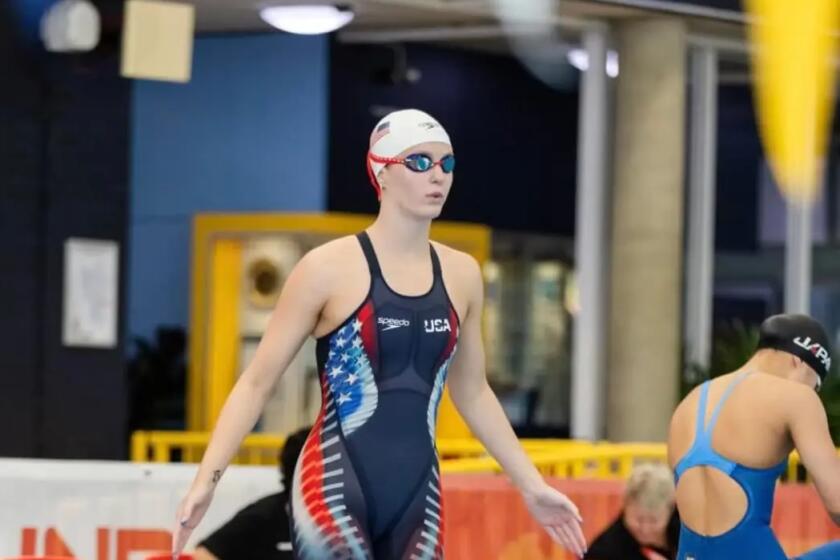The Cut Hasn’t Healed : Coach’s Call to Drop Player Drives Family to Sue, but School Supports Decision
- Share via
David Tritz shoots a basketball in privacy now, on an outdoor court near his La Habra home. He wants to be in a packed gym as the senior point guard on the St. Paul High School team.
That was the role he had expected to play--until this summer when his coach told him he was being dropped from the team because of a lack of ability and a bad attitude. Crushed, Tritz passes the afternoons aiming at the chain net, his fight to be reinstated so far unsuccessful.
Tritz, 17, had hoped to use his athletic skill and his academic record--he is an honor student at St. Paul in Santa Fe Springs--to win a scholarship to Loyola-Marymount University. That hope, he said, is gone.
He and his parents, Richard and Irene Tritz, believe that he has the ability and was cut unfairly from the team. They are angry at school officials and say they were never informed of an attitude problem.
Futile Effort
After a futile effort to resolve the matter within the school, the Tritzes filed a lawsuit against the Archdiocese of Los Angeles, seeking $10 million in punitive damages, saying the school broke faith with Tritz and that his being cut from the team could keep him out of college.
By the time the case comes to trial--maybe in five years--Tritz will have long since graduated. His chance for an early victory vanished Dec. 4 when Judge Warren H. Deering of Los Angeles Superior Court denied a preliminary injunction that would have returned Tritz to the team. Deering said he would not substitute his judgment for that of a coach.
The issues are emotional.
They start with Tritz’s ability. No one pretends that, at 6 feet and 170 pounds, he is a superstar, though there is evidence that he is a good player--but is he good enough to play in college, to earn an athletic scholarship?
Then there are the questions raised about Tritz’s attitude. Was he difficult and hard to coach, or are his complaints about a lack of playing time normal for an athlete?
A good part of the dispute hinges on Coach Mike Dinneen. Is he a competent evaluator of talent and did he fairly weigh that talent when he cut Tritz?
And, regardless of the merits of Dinneen’s decision, should the question of who plays be open to parents’ input?
Jeffrey Borns, attorney for the Archdiocese, said: “We feel the case is without merit and not suited for the courts. Our basic contention is that this is something for the coach to deal with. The coach made a proper decision.”
There is evidence to support both sides on all these issues.
Dinneen was named coach of the year in the Angelus League last season after the team went 12-9 and made the playoffs. Tritz, a reserve for most of the season, started the last seven games and was named the team’s best defensive player.
“I was right in my decision,” Dinneen said Tuesday. “The decision was based on coachability, attitude and performance. I shouldn’t have to answer about a coaching decision. I think the whole thing is intimidation. I know I’m right.”
Tritz said part of his frustration stems from being encouraged two years ago by Dinneen to give up football and baseball to concentrate on basketball. He said he went without gifts from his family for a year so he could attend Magic Johnson’s $375 basketball camp. And this summer, he played in the Compton Slam-N-Jam League.
“He was a pretty good player,” said Issy Washington, who runs the league. “Anybody who makes my league has to be good. I cut 200 people.”
But after competing in this league, Tritz was told on July 28 by Dinneen that he was off the team.
‘David Was Hysterical’
“There was no advance warning,” Irene Tritz said. “By the time my husband came home from work, David was hysterical.”
David said: “He blamed it on my ability. I was in a state of shock. I was totally devastated.”
Dinneen said in an interview that the prime reason for cutting Tritz was his play, though he said attitude was a factor.
Tritz averaged fewer than four points and three assists a game last year as a forward, said Dinneen, pointing out that Tritz was never used as a point guard because other players were better at that position.
“He could have the greatest attitude in the world this year but his playing time would be minuscule,” Dinneen said. “The kids coming up are a lot better.”
Don Mead, who runs an Irvine-based basketball scouting service, said of Tritz: “His chances (of getting a scholarship) prior to (being removed from the team) were practically nil. He was not a known player. His name has never been brought up by even Division III schools. If he had (a chance of getting a scholarship) his name would have been brought up to me by somebody.”
Attitude Dispute
Commenting on the boy’s attitude, Dinneen said that Tritz complained last season about lack of playing time and talked back to him several times.
Tritz said, “I thought we got along fine.”
Last May, Dinneen had his players evaluate one another. Nine of 12 players, he said, listed Tritz as needing to improve his attitude.
Jeff Willis, a longtime friend of Tritz and team captain, said he was shocked this summer when he heard that Tritz had been cut.
“He should be able to start for us, for sure,” Willis said this week. “He’s a real good point guard. I never saw an attitude problem. I don’t think (Dinneen) liked (Tritz) too much.”
Dinneen said there was no personality conflict between him and the ex-player.
Of Dinneen, Mead said: “He’s not the overbearing type. He’s a very good young coach. If he made a decision (to remove Tritz from the team), I’m sure he made it with care.”
In seeking the preliminary injunction, lawyers for Tritz filed 10 sworn declarations testifying to Tritz’s character. The testimonials came from St. Paul players, parents, coaches and teachers, said Joseph Fischbach of Beverly Hills, one of the Tritzes’ lawyers.
“Their case is based on alleged attitude problems,” Fischbach said, contending that the declarations refute that.
In one of the declarations, St. Paul forward Alex Flores describes what happened at a meeting this fall after Tritz was cut: “Coach stated to us David would no longer be with the team. When we asked why, he stated it was none of our business. He asked how many players felt David is the best point guard. Seven of nine raised their hands. Later, (Dinneen) said, ‘If you want to take David’s side in this, you’ll join him.’ ”
In his interview this week, Dinneen had a different version. He said 11 players were at the meeting and they voted 8-3 against Tritz.
Fischbach said the Archdiocese is being sued for breach of contract. “There’s a contract between the parents and the school that implies that children should be treated fairly,” he said. “(David) was kicked off for the team for no valid reason. That’s a breach.”
Eli Kantor, another lawyer for the Tritzes, said: “This attitude problem was never communicated to David or his parents. At St. Paul, the policy in the (school) handbook says that problems of that nature should be communicated to the parents as part of the Catholic philosophy” so that it can be resolved.
No one at the school, Richard Tritz said, told him that his son was having a problem on the team. The school handbook states that the administration expects “the parents to participate directly in the solution of all problems related to their children.”
“Dinneen had David in P. E. class, and gave him an A,” Irene Tritz said. “He never sent a deficiency note home. To qualify for an A your attitude must be of positive benefit to the class.”
Dinneen said that because basketball is extracurricular, he was not obligated under the school rules to tell the Tritzes anything.
The Tritzes went through grievance procedures at the school before suing.
Coach, Tritz Meet
They received a letter from the Rev. Aiden Carroll, who was then the principal and is now superintendent of the Department of Catholic Schools.
Carroll wrote that Dinneen “felt that his position as a coach would be undermined if parents or players are permitted to tell him who should or should not play. He is willing to meet with David and seriously reconsider his reinstatement to the varsity squad on condition that David writes him a letter saying that he realizes that he may not play much this year but is still willing to act positively to build team morale.”
Tritz then wrote a letter to Dinneen.
Shortly thereafter, Dinneen and Tritz met.
“There was no apology” during the meeting or in the letter, Dinneen said. “Nothing was done to make it seem like anything was going to change.”
Tritz maintained this week that he had apologized, although he said he wasn’t sure what he was apologizing for.
Tritz lawyers say they may appeal Judge Deering’s denial of an injunction.
In the meantime, Tritz shoots alone, helps coach grade-school players and considers going to a junior college next year to play basketball.
And Dinneen says he’s doing well without Tritz. Sophomore Jason Hart and junior John Guerrero are sharing the point guard job on a team that is 3-1.
“That has been our best position so far this year,” Dinneen said. “Those kids are playing great, we’ve been getting 16.5 points a game and 9 assists between them.”
And Irene and Richard Tritz say that this isn’t a case of a couple of parents thinking their son should play.
“It’s been David’s fight,” Irene Tritz said. “It’s not something we’re pushing. I feel that our job is to stand behind him.”
Times staff writer Paul McLeod contributed to this story.
More to Read
Get our high school sports newsletter
Prep Rally is devoted to the SoCal high school sports experience, bringing you scores, stories and a behind-the-scenes look at what makes prep sports so popular.
You may occasionally receive promotional content from the Los Angeles Times.






